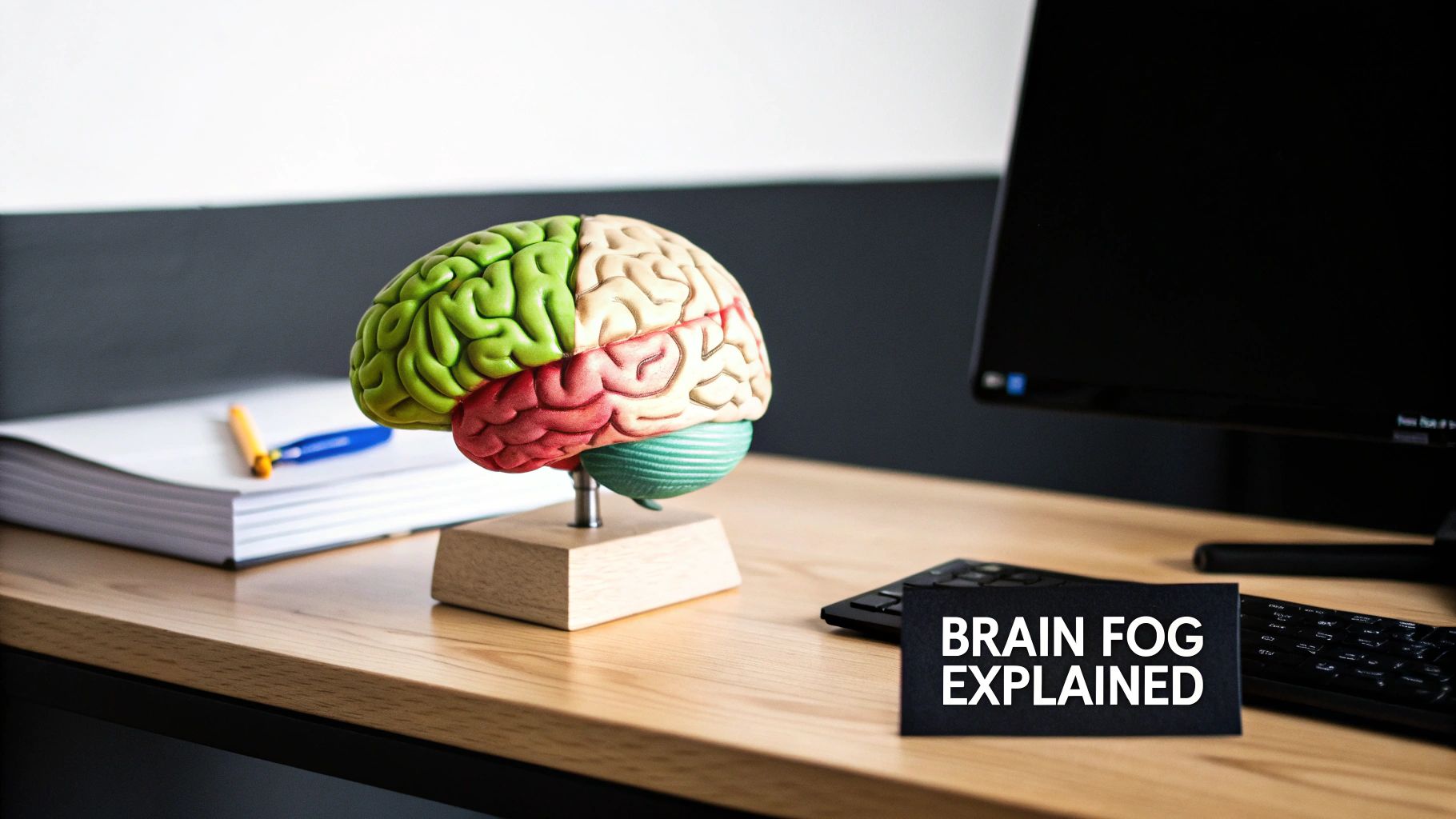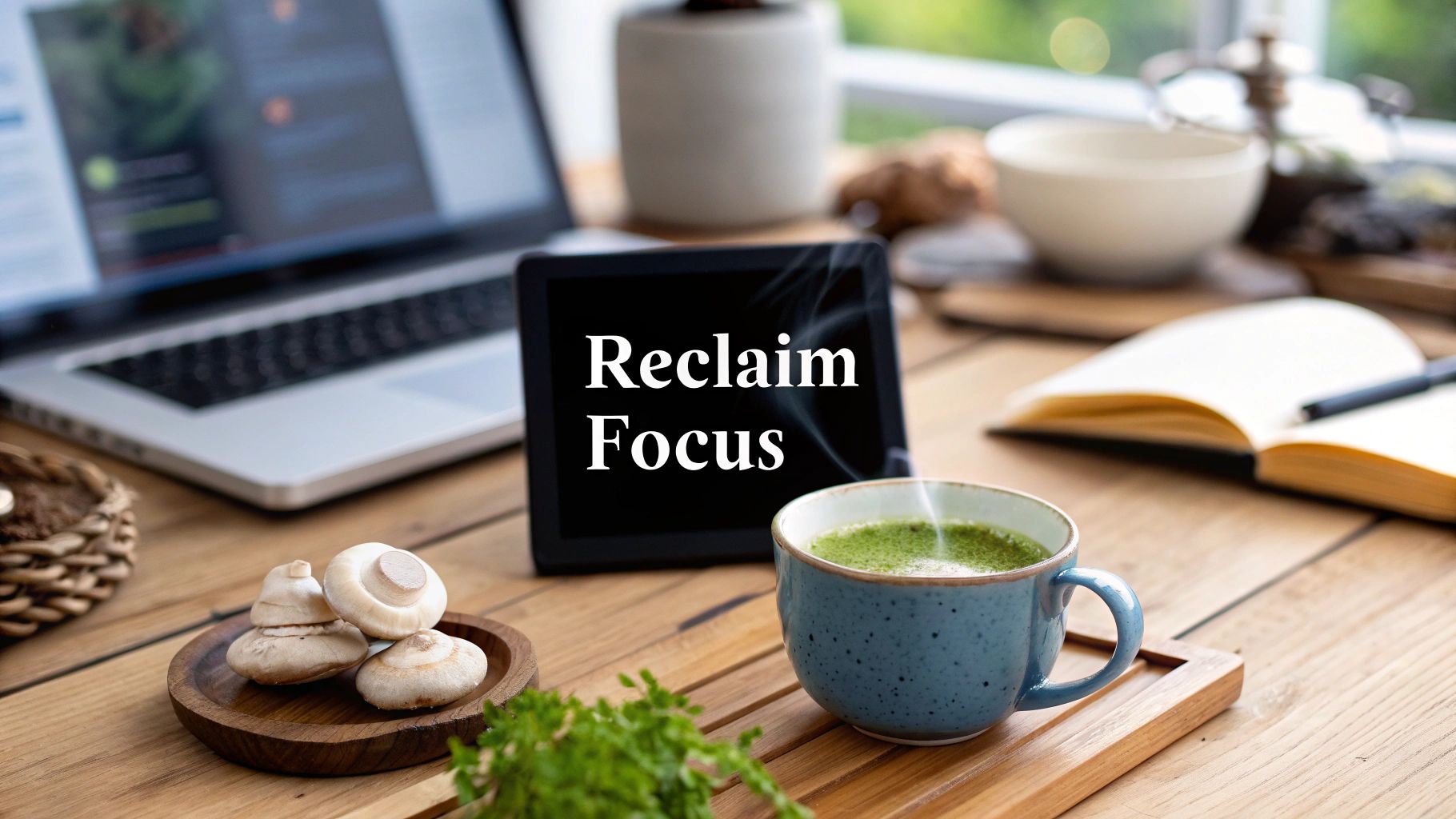Tackling brain fog naturally usually means looking at the bigger picture—a mix of diet, lifestyle tweaks, and some smart, targeted supplements. The best starting points are often the simplest: getting better quality sleep, learning to manage stress, and eating a diet packed with antioxidants and Omega-3s. From there, you can bring in powerful natural allies like ceremonial-grade matcha from Amatsu to help lock in that mental clarity.
What Does Brain Fog Actually Feel Like?

Let's be real—'brain fog' is a lot more than just having an off day. It’s that frustrating feeling of trying to see through a thick mist, where your thoughts, which are normally sharp and clear, feel muffled and just out of reach. While it isn't a medical diagnosis in itself, brain fog is a collection of symptoms that are a clear signal your brain isn’t quite firing on all cylinders.
Many people describe it as a constant mental haze that just blunts their edge. You might find yourself reading the same sentence over and over, struggling to make sense of it. Or maybe you’ve had that classic moment of walking into a room only to completely forget what you went in there for. It’s this kind of experience that can turn simple, everyday tasks into a real slog.
The Telltale Signs
Brain fog shows up differently for everyone, but there are a few common threads that most people recognise. These frustrating signs can easily disrupt your work, your relationships, and just your general sense of wellbeing. Knowing what to look for is the first step toward getting back on track.
Common signs you might be experiencing brain fog include:
- Memory Gaps: Suddenly struggling to recall recent events, people's names, or even where you left your keys.
- Wandering Focus: Finding it impossible to concentrate on one thing at a time without your mind drifting off.
- Mental Burnout: Feeling mentally wiped out, even if you’ve had a full night’s sleep.
- Sluggish Thinking: Noticing it takes you longer than usual to process information or make a decision.
This isn’t just a personal battle; it's something many of us are dealing with. In our fast-paced, high-stress world, things like constant information overload, chronic stress, and poor sleep are all piling on to create this widespread cognitive fatigue.
Think of brain fog as your brain’s check engine light. It's a vital signal telling you it's time to slow down, take a look at your daily habits, and find the right natural remedies to restore your balance and clarity.
Why It Feels Like Everyone Has It
If you’ve been feeling this mental sluggishness, you are far from alone. It's becoming an increasingly common experience, affecting a huge number of people across the UK. In fact, recent studies have shown that a staggering 28.2% of people reported dealing with brain fog symptoms, with powerful links to things like Long COVID and poor sleep. It turns out that people who’ve had Long COVID are nearly four times more likely to suffer from it. You can read the full research about these findings here.
By understanding that this is a shared experience, we can shift from feeling frustrated to feeling empowered. Recognising the symptoms is the jumping-off point for exploring practical, natural solutions that can genuinely make a difference.
Getting to the Root of Your Mental Haze

That foggy feeling you can't seem to shake isn't just "in your head." It’s a real signal from your brain that something is off-balance. To really clear the fog, we need to do a bit of detective work and pinpoint the hidden culprits messing with your mental clarity.
These triggers are often sneakily woven into our daily lives, quietly draining our focus. Think of your brain as a finely tuned engine. If you put in the wrong fuel or run it ragged without a break, its performance is going to suffer. The same goes for your mind.
The Weight of Chronic Stress
When you’re constantly under pressure, your body floods itself with cortisol, the main stress hormone. In small doses, cortisol is a lifesaver—an emergency alarm system that sharpens you up. But when that alarm is blaring all day, every day, it starts to scramble your brain's communication lines.
This constant state of high alert can seriously disrupt memory and make it almost impossible to focus. The end result? That classic brain fog feeling of being scattered, overwhelmed, and just not quite there.
The Fog of Poor Sleep
A lack of quality sleep is one of the biggest and most common drivers of a foggy mind. While you’re in deep sleep, your brain is busy taking out the bins—clearing away the metabolic waste that builds up during the day. When you cut that process short, it’s like letting rubbish pile up, making it harder for your brain cells to talk to each other.
This is a huge issue in the UK, where around 35% of adults struggle with their sleep. The NHS has noted a strong link between poor sleep and brain fog, with symptoms reported by up to 40% of younger people dealing with fatigue. They often recommend getting back to basics with good sleep, a balanced diet, and gentle exercise to help clear the head.
Food, Fuel, and Focus
What you eat is, quite literally, brain food. A diet heavy in processed foods, sugar, and unhealthy fats can spark inflammation and oxidative stress, which are two of the biggest enemies of mental clarity. These foods send your blood sugar on a rollercoaster, leaving your brain lurching between energy spikes and slumps.
On the flip side, a diet that's missing key nutrients like Omega-3s, B vitamins, and antioxidants is essentially starving your brain of the tools it needs to function. Without the right fuel in the tank, your cognitive engine simply can't run at full power. If you’re searching for a clean, steady energy source, our guide on how matcha provides energy without the crash is a great place to start.
Figuring out your personal triggers—be it stress, sleepless nights, or what’s on your plate—is the most powerful first step. It shifts you from just coping with the symptoms to tackling the very source of the haze.
Building Your Anti-Brain Fog Diet Plan
What you put on your plate has a direct and powerful impact on how clearly you think. Crafting an anti-brain fog diet isn’t about harsh restrictions; it’s about making smart, strategic choices that nourish your brain and provide the specific nutrients it needs to cut through the haze. Think of it as upgrading the fuel for your cognitive engine.
Moving beyond generic advice means focusing on ingredients proven to fight that feeling of mental fatigue. Certain foods provide the essential building blocks for healthy brain cells, protect against oxidative damage, and ensure a steady supply of energy for sustained focus throughout the day.
Power Up with Brain-Boosting Nutrients
First on the list are Omega-3 fatty acids—these are absolutely non-negotiable for brain health. Found in oily fish like salmon and mackerel, these healthy fats are crucial for building and repairing brain cells. They essentially help improve the communication between neurons, a bit like insulating electrical wires to ensure a clear, strong signal.
Next, you’ll want to load up on antioxidants. Think of all those colourful fruits and vegetables, especially berries. They're packed with these protective compounds that act like a dedicated security team for your brain, neutralising harmful free radicals that cause cellular damage and contribute to that foggy feeling.
For sustained mental energy, always choose complex carbohydrates over simple sugars. Foods like oats, quinoa, and sweet potatoes release glucose slowly, providing a steady stream of fuel to your brain. This simple switch helps you avoid the sharp spikes and inevitable crashes in blood sugar that often lead to concentration lapses and afternoon slumps.
A Quick Guide to Brain Foods
To make things simpler, it helps to think in terms of what to add and what to avoid. Here’s a quick comparison to guide your choices at the supermarket and in the kitchen.
Brain-Boosting Foods vs. Brain-Draining Foods
| Brain-Boosting Foods (Eat More) | Why It Helps | Brain-Draining Foods (Limit or Avoid) | Why It Hinders |
|---|---|---|---|
| Fatty Fish (Salmon, Mackerel) | Rich in Omega-3s, which are critical for brain cell structure and communication. | Sugary Drinks & Snacks | Cause blood sugar spikes and crashes, leading to energy dips and poor focus. |
| Berries (Blueberries, Strawberries) | Packed with antioxidants that protect brain cells from damage and inflammation. | Refined Carbs (White Bread, Pasta) | Quickly convert to sugar, leading to the same energy rollercoaster as sugary snacks. |
| Turmeric & Ginger | Powerful anti-inflammatory spices that can reduce brain inflammation. | Processed & Fried Foods | High in unhealthy fats and preservatives that promote inflammation and oxidative stress. |
| Leafy Greens (Spinach, Kale) | Loaded with brain-protective nutrients like vitamin K, lutein, and folate. | Excessive Alcohol | Acts as a neurotoxin, directly impacting brain function and contributing to fogginess. |
| Nuts & Seeds (Walnuts, Flaxseeds) | Excellent plant-based sources of Omega-3s and antioxidants like vitamin E. | Artificial Sweeteners | Some studies suggest they can alter brain chemistry and negatively impact mood. |
Making a conscious effort to swap items from the right column for those on the left is one of the most effective dietary changes you can make for your mental clarity.
Incorporating Nootropic Foods and Herbs
Beyond basic nutrition, certain foods and herbs have what are known as nootropic properties, meaning they can actively support and enhance cognitive function. Weaving these into your meals is a simple yet powerful strategy for sharpening your mind.
Think of your diet as a toolkit for mental clarity. Each meal is an opportunity to add another tool—whether it's the anti-inflammatory power of turmeric, the focus-enhancing properties of Lion's Mane mushroom, or the antioxidant protection from dark leafy greens.
One of the most potent and enjoyable nootropics you can add to your daily routine is ceremonial-grade matcha. Unlike other sources of caffeine, matcha contains L-theanine, an amino acid that works with caffeine to promote a state of calm, alert focus. This unique synergy delivers sustained mental energy without the jitters or the dreaded crash that so often follows a cup of coffee.
Amatsu Matcha, particularly our Shrooms blend which includes Lion's Mane, is specifically designed to support cognitive health. We’ve even written about this incredible combination, and you can explore our deep dive into the benefits in our article on how Lion's Mane and matcha boost focus without the crash. It makes for an essential—and delicious—part of any effective anti-brain fog diet.
Adopting Lifestyle Rituals for Lasting Clarity
You can't just wish brain fog away with a quick fix. Lasting mental clarity is something you build, day by day, through consistent habits. Think of it less as adding demanding chores to your list and more as creating simple, powerful rituals that act as acts of self-care for your mind.
These daily practices are like essential maintenance for your brain. You wouldn't expect a car to run smoothly without regular checks, and your mind is no different. It needs consistent care to stay sharp. The brilliant thing is that these small, repeated actions build on each other, creating a strong foundation for your cognitive health over time.
Embrace Mindful Movement
Getting your body moving is one of the most powerful things you can do to clear your head. It’s not just about fitness; it’s about physiology. Movement gets blood and oxygen pumping to your brain, which is exactly what it needs to function at its best. For a pre-workout boost that supports focus and endurance, a serving of Amatsu Strength matcha can be a game-changer.
Even gentle activity makes a huge difference. A brisk 20-minute walk is often enough to boost alertness and shake off that hazy feeling. A mindful yoga session can do wonders for lowering the stress hormones that so often fuel the fog. The real secret is finding something you actually enjoy, so it becomes a welcome part of your day, not another task.
The mindful ritual of preparing a daily cup of matcha can be a powerful anchor in your routine, creating a moment of calm focus. This simple act combines the benefits of mindfulness with the cognitive support of L-theanine, setting the stage for a clearer day.
Tame Stress with Simple Mindfulness
That constant, nagging mental chatter? It’s a huge contributor to brain fog. Mindfulness exercises are your secret weapon for quieting that inner noise and reclaiming your focus. You don't need to meditate for an hour to feel the effects—just start with a simple five-minute breathing exercise each morning.
Find a comfortable seat, close your eyes, and bring your full attention to the sensation of your breath. Your mind will inevitably wander, and that's completely normal. The practice is in gently guiding it back, time and time again. This trains your brain to stay in the present moment, cutting through that overwhelming feeling that often comes with a foggy mind.
The Power of a Digital Detox
In a world where we're always switched on, our brains rarely get a chance to switch off. The endless stream of notifications and information overload is a recipe for serious cognitive fatigue. That’s why scheduling regular digital detoxes is no longer a luxury—it’s crucial for letting your mind rest and reset.
Here are a few simple ways to start dialling down the digital noise:
- Set Tech-Free Hours: Carve out specific times, like the first hour after you wake up or during meals, as completely screen-free.
- Silence the Pings: Go into your phone’s settings and turn off all non-essential notifications. You’ll be amazed at how much focus you get back.
- Create a Restful Sleep Environment: Make your bedroom a strict screen-free zone. The blue light from our devices is known to disrupt sleep, which is your brain's prime time for restoration.
Here in the UK, simple rituals like enjoying a cup of herbal tea are also widely recognised for helping the mind. Peppermint tea, for instance, has long been a go-to natural remedy for brain fog. A 2023 survey found that around 18% of UK adults regularly drink herbal teas for their wellbeing, showing a real shift towards these kinds of accessible, natural solutions. You can learn more about the specific health benefits of matcha in our detailed guide.
Tapping into Adaptogens and Matcha to Cut Through the Fog
 When your diet is clean and your lifestyle is on point, but the mental haze just won’t lift, it might be time to call in some reinforcements. Sometimes that persistent brain fog demands a more targeted approach, and that’s where nature’s own toolkit comes into play.
When your diet is clean and your lifestyle is on point, but the mental haze just won’t lift, it might be time to call in some reinforcements. Sometimes that persistent brain fog demands a more targeted approach, and that’s where nature’s own toolkit comes into play.
Adaptogens and ceremonial-grade matcha are two of the most potent allies you can have in your corner. They work from the inside out to help restore your inner balance and bring back that sharp mental edge you’ve been missing.
Think of adaptogens as your body's personal stress management coaches. These remarkable herbs and fungi do more than just paper over the cracks; they help your entire system become more resilient to whatever life throws at it, both physically and mentally. Rather than giving you a jolt, they offer a subtle, rebalancing effect that brings your body back into alignment.
Meet Your Nootropic Allies
When it comes to boosting brainpower, two adaptogenic mushrooms stand head and shoulders above the rest: Lion’s Mane and Cordyceps. These aren’t the kind you’d slice into a stir-fry; they are powerful nootropics, known for their ability to support cognitive performance.
-
Lion's Mane: Often nicknamed the "smart mushroom," Lion's Mane is famous for its potential to support nerve growth factor (NGF). NGF is a protein that’s absolutely vital for keeping our neurons healthy and happy. The result? Sharper memory, better focus, and a healthier brain overall.
-
Cordyceps: If you’re feeling mentally drained, Cordyceps is your go-to. It’s known for helping the body use oxygen more efficiently and boosting ATP production—the very fuel that powers our cells. For your brain, this means more energy and better blood flow, which is exactly what you need to fight off that feeling of fatigue.
These adaptogens get to the heart of the problem by addressing the physiological stress that so often fuels brain fog, offering a sustainable path back to mental clarity.
The Ultimate Solution: Ceremonial Grade Matcha
While adaptogens work on building your long-term resilience, ceremonial-grade matcha delivers that immediate, clean focus you need to get through the day. What makes it so effective is its unique combination of caffeine and an amazing amino acid called L-theanine.
Unlike the jarring jolt from coffee, the caffeine in matcha is released slowly, thanks to L-theanine. This creates a state of calm alertness—a smooth, sustained wave of focus without the anxiety, jitters, or the inevitable afternoon crash.
This incredible duo works together to boost alpha brain waves, which are linked to a state of relaxed awareness. You’re left with a heightened sense of focus, an improved memory, and far less mental clutter. If you’re intrigued by the science behind it, our guide on what exactly is in matcha powder breaks it all down.
Your Amatsu Matcha Toolkit for a Clearer Mind
Here at Amatsu Matcha, we’ve put a lot of thought into creating blends that bring these powerful ingredients together. Our goal is to give you a simple, effective daily ritual to defend against brain fog.
-
Amatsu Shrooms: This is our hero blend for cognitive support. It’s carefully formulated with both Lion’s Mane and Cordyceps, combining their power with the focused energy of our premium matcha. It's the ideal choice for building lasting mental resilience and fighting off fatigue.
-
Amatsu Pure: For days when you need pure, unadulterated clarity, our ceremonial-grade matcha delivers that clean, sharp focus to help you stay at the top of your game.
-
Amatsu Radiance: Infused with marine collagen, this blend supports not just mental clarity but also your skin, hair, and nails. It’s the perfect ritual for feeling your best from the inside out.
-
Amatsu Strength: Formulated to enhance physical performance, this blend is your pre-workout partner for boosting endurance and maintaining mental focus during exercise.
Your Daily Routine to Overcome Brain Fog
Knowing what to do is one thing, but actually putting it into practice is where the real change happens. So, let's build a simple, repeatable daily routine that weaves these natural remedies for brain fog into your life. This isn’t about a massive, intimidating overhaul. It's about taking small, consistent steps that build powerful, lasting habits for mental clarity.
This is a practical plan to make a sharper mind feel not just possible, but manageable. Your journey out of the haze starts with the very next choice you make.
A Sample Day for a Clearer Mind
Here’s a simple blueprint for a day designed to fight brain fog. Think of it as a starting point—feel free to adapt it to your own schedule and what feels right for you.
Morning (7:00 AM - 9:00 AM)
How you start your morning can make or break your entire day. Before you even think about reaching for your phone, try taking just five minutes for a simple breathing exercise. It’s a fantastic way to calm your nervous system right from the get-go. After that, a big glass of water is essential to rehydrate your brain.
Next, it’s time to create a mindful ritual around your morning drink. This is where swapping your usual coffee for a bowl of Amatsu Shrooms or Amatsu Radiance can make a huge difference. The unique combination of L-theanine and gentle caffeine provides a calm, sustained focus to ease you into your day, helping you sidestep the jitters and eventual crash that so often feed the fog. If you're curious about the science behind it, we have a guide comparing the clean energy of matcha vs coffee.
Midday (12:00 PM - 2:00 PM)
That dreaded afternoon slump… it’s prime time for brain fog to roll in. Instead of trying to power through with another hit of caffeine, physically step away from your desk. A brisk 20-minute walk outside can work wonders. It gets the oxygen flowing to your brain and acts as a natural reset button for your focus.
Pair this with a brain-friendly lunch. Make sure your meal includes a good source of lean protein, healthy fats like avocado or a drizzle of olive oil, and plenty of leafy greens. This combination provides the steady, reliable fuel your brain needs to power through the rest of the day without those frustrating energy dips.
A midday reset isn't a luxury; it's a strategic move. Stepping away from your work to move your body is one of the most effective ways to clear mental clutter and return with a renewed sense of focus.
Evening (7:00 PM onwards)
Your evening routine is absolutely crucial for preparing your brain for deep, restorative sleep. A great place to start is with a "digital detox" at least an hour before you plan to sleep. Powering down your screens reduces your exposure to blue light, which is notorious for messing with your body’s natural sleep signals.
Use this newfound time to properly unwind. You could read a book, do some gentle stretching, or spend a few minutes journaling. The goal is to help your mind shift away from the day's stressors and into a state of rest. These small, consistent actions create the perfect conditions for your brain to repair and recharge, so you can wake up feeling genuinely refreshed and clear-headed.
At Amatsu Matcha, we believe that reclaiming your mental clarity should be a simple, daily ritual. Our ceremonial-grade matcha is designed to provide that clean, sustained focus to help you cut through the fog and perform at your best.
Discover the Amatsu Matcha collection and start your journey to a clearer mind today.
Read more

Curious about matcha latte caffeine? Discover how it compares to coffee, what affects its strength, and how to create your perfect energy-boosting drink.

Discover the top marine collagen benefits for skin. Learn how it boosts hydration, reduces wrinkles, and revitalizes your skin for a natural, youthful glow.
